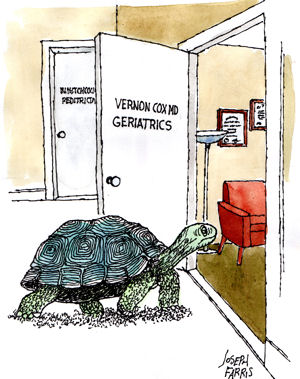The ethics of end-of-life care erupt in the ICU
A Harvard expert moderates a new column on ethical case studies and suggests some practical strategies for handling and preventing conflicts. Case study: The ethics of end-of-life care erupt in the ICU.
A 51-year-old man is admitted to the ICU from another hospital with severe anoxic brain damage several days after an unanticipated post-operative cardiac arrest. After several weeks, he is judged to be in a vegetative state, but a subsequent neurology consultation advises that a persistent vegetative state cannot be diagnosed before three months. The patient's male partner of 20 years, his legally designated proxy, is sure that the patient would not want to live in this condition. However, the patient's sister adamantly insists that life-prolonging measures continue for the full three months. She threatens the partner with legal action and says she will hold him forever responsible if her brother dies.
Commentary
In the U.S., a competent patient has the right to refuse any treatment and an appropriately designated legal surrogate may exercise that right on an incompetent patient's behalf. But a family member overwhelmed by the shock of a relative's unexpected, devastating illness can have a particularly hard time making a good, patient-centered decision. The patient's physician thus has an obligation not simply to respect a proxy's choice but to help the proxy make the best decision possible.
The central substantive question about any proposed treatment is, “Do the expected benefits outweigh the expected burdens from the patient's perspective?” In my experience, ICU disagreements about treatment most often involve conflicting opinions about prognosis. An accurate understanding of prognosis is crucial and the consulting neurologist should aim for as much precision as is possible. General phrases like “prognosis poor” or “cannot rule out some recovery” are usually unhelpful. It is quite possible that a patient may improve but unlikely that the improvement will reach a level satisfactory to the patient. Questions that help elicit a better response from the neurologist include, “What is the maximum level of recovery that you consider realistic to hope for and what would it take to achieve that?” The next question, for family, is whether they think the patient would agree to the necessary care plan given his expected level of recovery.
The physician should obtain any available evidence about the patient's perspective and should welcome the sister's input. In addition, efforts should be made to prevent enduring enmity within the family. This can be viewed mistakenly as “treating the sister” rather than the patient, possibly conflicting with respect for the patient's wishes. But the single most important concern of many patients near the end of life is the well-being of their loved ones and most would not favor a decision-making path that leaves enduring family scars. Obviously, it would be optimal to unite the family in reaching consensus about a patient-centered care plan but those efforts, however skillful, may fail. The physician must then be guided by the proxy, the person the patient specifically chose to be his voice.
Follow-up
A large family meeting convened and began with considerable tension and hostility. Initial ground rules were specified: the attending physician was morally and legally obligated to provide care based on the best evidence of the patient's wishes; if there was disagreement about the patient's voice, the partner/proxy had ultimate legal and moral authority.
The patient's partner recounted conversations in which the patient had clearly said he would not want his life prolonged if he were severely and permanently disabled. The sister then reiterated her insistence that the patient deserved “every possible chance.” After some additional discussion, the sister was asked “Of course you love your brother and want to help him, but is there anything at all that you know about him that makes you think he would say at this point, ‘Please keep me alive’?” After a long hesitation, she burst into tears and said “No, I guess I'm just being selfish.” Other family members rushed to comfort her and the entire dynamic changed.
At the end of the meeting, the physician announced that he would transition care to the fully comfort-oriented approach that his patient clearly would want. The patient died of pneumonia several days later in a private room with family gathered at his bedside talking about how they would keep his memory alive for one another.



